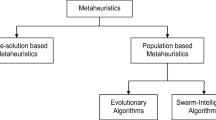Abstract
This paper describes an application of genetic algorithms to the bus driver scheduling problem. The application of genetic algorithms extends the traditional approach of Set Covering/Set Partitioning formulations, allowing the simultaneous consideration of several complex criteria. The genetic algorithm is integrated in a DSS but can be used as a very interactive tool or a stand-alone application. It incorporates the user's knowledge in a quite natural way and produces solutions that are almost directly implemented by the transport companies in their operational planning processes. Computational results with airline and bus crew scheduling problems from real world companies are presented and discussed.
Similar content being viewed by others
Author information
Authors and Affiliations
Corresponding author
Rights and permissions
About this article
Cite this article
Dias, T., de Sousa, J. & Cunha, J. Genetic algorithms for the bus driver scheduling problem: a case study. J Oper Res Soc 53, 324–335 (2002). https://doi.org/10.1057/palgrave.jors.2601312
Received:
Accepted:
Published:
Issue Date:
DOI: https://doi.org/10.1057/palgrave.jors.2601312




